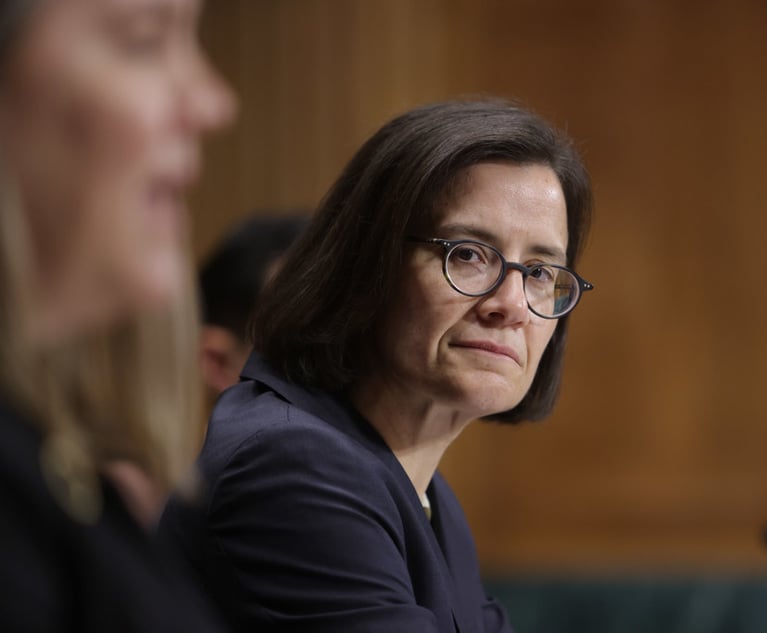 Brackett Denniston, former GC of General Electric.
Brackett Denniston, former GC of General Electric.Chamber Fires Back in Debate With Third-Party Funders Over Disclosure
Brackett Denniston III, the former GE GC who now chairs the U.S. Chamber Institute for Legal Reform, continued a volley of letters to a federal committee considering proposed changes to disclosure rules writing: "The funding industry has long existed in darkness. It is time for it to emerge into the light."
March 26, 2019 at 07:02 PM
3 minute read
The former general counsel of General Electric on Tuesday re-upped a call for transparency in cases where third-party funders take positions in federal litigation.
Former GE GC Brackett Denniston III, now the chairman of the U.S. Chamber Institute for Legal Reform, wrote a letter to the committee at the Administrative Office of the U.S. Courts, which is considering proposed changes to federal discovery rules that would require a more fulsome disclosure of when third-party funders are involved in federal court.
“The funding industry has long existed in darkness,” Denniston wrote. “It is time for it to emerge into the light.”
Denniston's letter continues a volley of letter-writing to the committee by responding to concerns raised in a letter from three officials at major litigation funders, who themselves were responding to a letter to the committee from 30 former and current in-house lawyers, including Denniston, who were calling for greater disclosure.
The funders, which included officials at Therium Capital Management Ltd., Bentham IMF and Burford Capital, wrote last month that the push from companies to amend the Federal Rules of Procedure to require third-party litigation funders to reveal their positions amounts to “a push for forced disclosure of irrelevant information that one party is simply curious to know.”
But in Tuesday's response from Denniston, the former GE GC wrote that parties and courts have a right to know, for example, whether a presiding judge or juror in a case might be invested in a funder that has an interest in a particular outcome. Denniston also wrote that in class actions disclosure could be “critical to the adequacy of representation” required under the Federal Rules.
Denniston also expressed doubt to the funders' claims that companies are frequent users of litigation funding. “It may be true in some cases, but as one who served for more than 20 years as the general counsel and head of litigation for a major U.S. company, consider me skeptical funding is as popular as some of its supporters maintain,” Denniston wrote. “Companies are skilled at identifying meritorious cases and funding them. But, whether companies use funding or not has no relevance to whether these arrangements should be as secret as a Grand Cayman bank account,” he wrote.
Read Denniston's full letter below:
Read more:
This content has been archived. It is available through our partners, LexisNexis® and Bloomberg Law.
To view this content, please continue to their sites.
Not a Lexis Subscriber?
Subscribe Now
Not a Bloomberg Law Subscriber?
Subscribe Now
NOT FOR REPRINT
© 2024 ALM Global, LLC, All Rights Reserved. Request academic re-use from www.copyright.com. All other uses, submit a request to [email protected]. For more information visit Asset & Logo Licensing.
You Might Like
View All
‘Not A Kindergarten Teacher’: Judge Blasts Keller Postman, Jenner & Block, in Mass Arb Dispute
6 minute read

Blake Lively's claims that movie co-star launched smear campaign gets support in publicist's suit
4 minute read
Solana Labs Co-Founder Allegedly Pocketed Ex-Wife’s ‘Millions of Dollars’ of Crypto Gains
4 minute readTrending Stories
- 1'Largest Retail Data Breach in History'? Hot Topic and Affiliated Brands Sued for Alleged Failure to Prevent Data Breach Linked to Snowflake Software
- 2Former President of New York State Bar, and the New York Bar Foundation, Dies As He Entered 70th Year as Attorney
- 3Legal Advocates in Uproar Upon Release of Footage Showing CO's Beat Black Inmate Before His Death
- 4Longtime Baker & Hostetler Partner, Former White House Counsel David Rivkin Dies at 68
- 5Court System Seeks Public Comment on E-Filing for Annual Report
Who Got The Work
Michael G. Bongiorno, Andrew Scott Dulberg and Elizabeth E. Driscoll from Wilmer Cutler Pickering Hale and Dorr have stepped in to represent Symbotic Inc., an A.I.-enabled technology platform that focuses on increasing supply chain efficiency, and other defendants in a pending shareholder derivative lawsuit. The case, filed Oct. 2 in Massachusetts District Court by the Brown Law Firm on behalf of Stephen Austen, accuses certain officers and directors of misleading investors in regard to Symbotic's potential for margin growth by failing to disclose that the company was not equipped to timely deploy its systems or manage expenses through project delays. The case, assigned to U.S. District Judge Nathaniel M. Gorton, is 1:24-cv-12522, Austen v. Cohen et al.
Who Got The Work
Edmund Polubinski and Marie Killmond of Davis Polk & Wardwell have entered appearances for data platform software development company MongoDB and other defendants in a pending shareholder derivative lawsuit. The action, filed Oct. 7 in New York Southern District Court by the Brown Law Firm, accuses the company's directors and/or officers of falsely expressing confidence in the company’s restructuring of its sales incentive plan and downplaying the severity of decreases in its upfront commitments. The case is 1:24-cv-07594, Roy v. Ittycheria et al.
Who Got The Work
Amy O. Bruchs and Kurt F. Ellison of Michael Best & Friedrich have entered appearances for Epic Systems Corp. in a pending employment discrimination lawsuit. The suit was filed Sept. 7 in Wisconsin Western District Court by Levine Eisberner LLC and Siri & Glimstad on behalf of a project manager who claims that he was wrongfully terminated after applying for a religious exemption to the defendant's COVID-19 vaccine mandate. The case, assigned to U.S. Magistrate Judge Anita Marie Boor, is 3:24-cv-00630, Secker, Nathan v. Epic Systems Corporation.
Who Got The Work
David X. Sullivan, Thomas J. Finn and Gregory A. Hall from McCarter & English have entered appearances for Sunrun Installation Services in a pending civil rights lawsuit. The complaint was filed Sept. 4 in Connecticut District Court by attorney Robert M. Berke on behalf of former employee George Edward Steins, who was arrested and charged with employing an unregistered home improvement salesperson. The complaint alleges that had Sunrun informed the Connecticut Department of Consumer Protection that the plaintiff's employment had ended in 2017 and that he no longer held Sunrun's home improvement contractor license, he would not have been hit with charges, which were dismissed in May 2024. The case, assigned to U.S. District Judge Jeffrey A. Meyer, is 3:24-cv-01423, Steins v. Sunrun, Inc. et al.
Who Got The Work
Greenberg Traurig shareholder Joshua L. Raskin has entered an appearance for boohoo.com UK Ltd. in a pending patent infringement lawsuit. The suit, filed Sept. 3 in Texas Eastern District Court by Rozier Hardt McDonough on behalf of Alto Dynamics, asserts five patents related to an online shopping platform. The case, assigned to U.S. District Judge Rodney Gilstrap, is 2:24-cv-00719, Alto Dynamics, LLC v. boohoo.com UK Limited.
Featured Firms
Law Offices of Gary Martin Hays & Associates, P.C.
(470) 294-1674
Law Offices of Mark E. Salomone
(857) 444-6468
Smith & Hassler
(713) 739-1250






